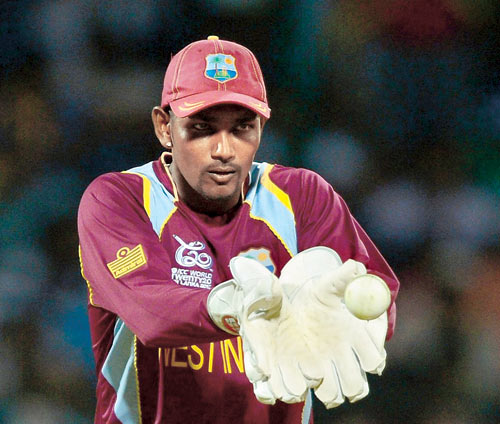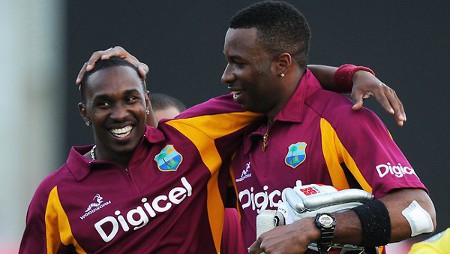7.45pm, June 14, 2013, The Kennington Oval. It is drizzling steadily but West Indian ODI captain Dwayne Bravo and his immediate predecessor Darren Sammy decline to leave the field. AB de Villiers and his South Africans, who looked hard-pressed to salvage a much-needed win, have long since disappeared into the pavilion; they will progress to the semifinal round.
The West Indians, with all the momentum on their side, will be left behind.
The symbolism is stark, the situation a metaphor for the state of West Indian leadership, for the anachronism that is West Indies cricket. To paraphrase the calypsonian, cricket gone, cricketers stay.

A couple minutes earlier, Umpires Steve Davis and Rod Tucker finally pulled the pin on the all-important Group B match. The end has eventually come a full 20 minutes after the 7.22pm deadline stipulated by the tournament rules. But the West Indians have the “idosity” to remain on the field, hoping against hope, wishing, appealing….
This team which, with only 30 balls left in the match, had had their fate almost literally in their hands, is now reduced to praying for an external intervention. But, as the Proteas know to their cost, umpires are not gods—at any rate, certainly not since the game has embraced technology. And, even before that, none has ever had the right to be a deus ex machina; they have to act within the rules.
It was the rules that did WI in or, more precisely, as I have argued in another place, ignorance of the rules. Perhaps even, I daresay, ignorance period.
Had Sammy and his principals known the rules, had he been aware of the Duckworth/Lewis par score, would he not have raced to the crease at the fall of Kieron Pollard’s wicket and be ready to face the next ball even before Ryan McLaren was ready to start his run-up?
But Trinidadians walk around, as my late brother used to lament, with their heads empty. And though Bravo is the only one of the three born in T&T, on the evidence of June 14, Sammy and Coach Ottis Gibson have both had a steady diet of cascadura.
Trinidadian too are those responsible for the media in this part of the world. “TOUGH LUCK” lamented the Saturday Express; on St Vincent Street, the sports editor on duty opted for “HEARTBREAK.” Stories identical except for editorial edits—itself a commentary on the state of local sports journalism—contained this paragraph: “If Pollard had kept his wicket intact after scoring a 23-ball 28 West Indies would have been the winners and advanced along with Indian from Group B.”
But both headlines give no hint of the degree to which human error—and not rain or the D/L method or anything else in our stars but not in our selves—was responsible for the West Indian elimination.
Sports Max’s “In the Zone” guest Jeffrey Dujon insisted that Bravo’s men were at fault, had given the match away. But on television, the Line and Length—no depth!—analyst hired to make sense of the proceedings for us all more than once explicitly concluded that the West Indian loss was merely “unfortunate.”

There is also, of course, the Denesh Ramdin dropped catch saga that perhaps—perhaps not—tells us something about what, in the Age of the Mercenary, people with a cocrico and a scarlet ibis on their passports have become. But those who need more evidence from the tournament that West Indian empty-headedness is often at the root of our troubles should have a close look at the video of the run-out of Darren Bravo.
Looking much, much better at the crease than he had in the India game, Bravo seemed to decide that his hefty pull off McLaren deserved at least two runs; Samuel did not agree and said so early into Bravo’s attempted second run. Given the mess the bowler made of breaking the stumps, he might just have had a chance to get safely back home. But Bravo the Younger never turned back, never even stopped.
West Indian cricket is about hands and feet; we’ll use our heads in football.
Unfair? Well, perhaps. But there are moments when the observant onlooker is certain that the West Indian ship is allowed to sink—or come perilously close to it—for a ha’penny worth of thought.
There was generally plenty of thought, however, in the captaincy of Bravo the Elder.

I found infuriating his failure to instruct Pollard as to what to do at the start of McLaren’s fourth over but I am on the record as laying that blame squarely at the coach’s feet. Overall, though, I found his handling of the team to be refreshingly thoughtful and pro-active. His fielding and bowling changes—I counted 15 after the end of the mandatory powerplay—were timely, showing clear evidence of the existence of a plan though not always of homework done.
And there is much more flexibility, it seems, in the architectural plan he has in his head for a batting line-up that essentially won the 2012 T20 World Cup. There is, however, in my view, not yet quite enough flexibility or quite enough thought, perhaps not so much after the innings has begun as at the stage of selecting the team.
But that will have to wait for another day.
Earl Best taught cricket, French, football and Spanish at QRC for many years and has written consistently for the Tapia and the Trinidad and Tobago Review since the 1970’s.
He is also a former sports editor at the Trinidad Guardian and the Trinidad Express and is now a senior lecturer in Journalism at COSTAATT.
 Wired868 Wired868 for smart sport news and opinion
Wired868 Wired868 for smart sport news and opinion






